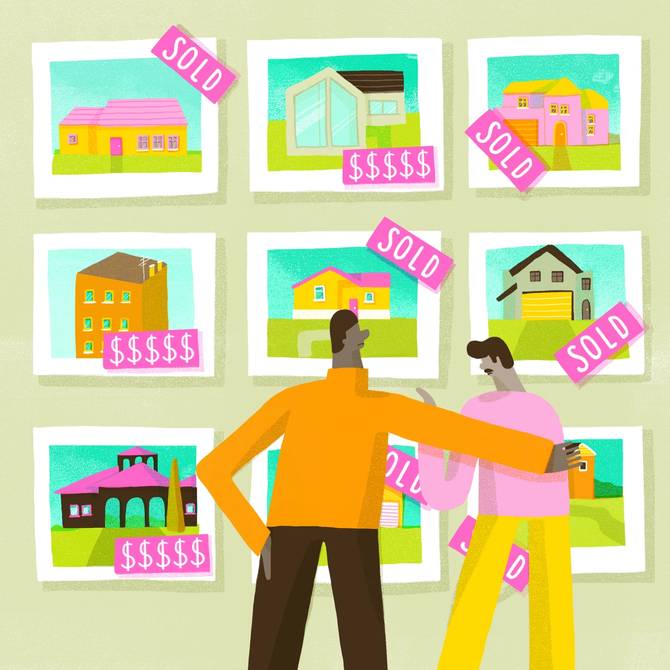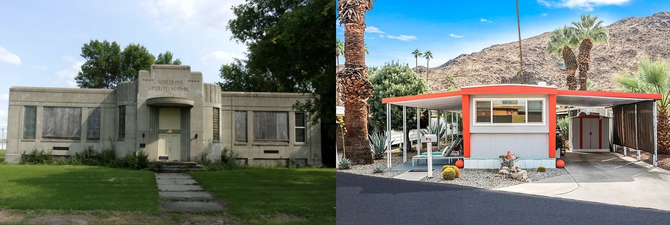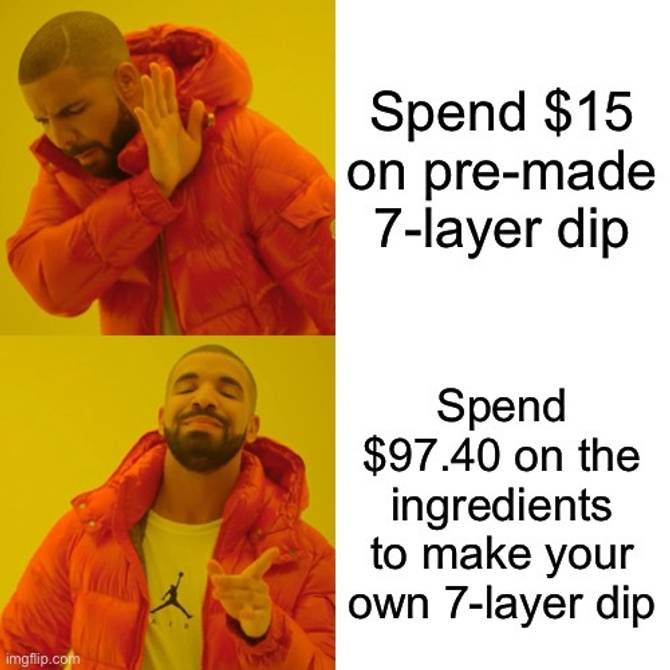| | | | | |  Beth Walrond | | IN THIS ISSUE | Hinge's CEO gives us dating tips | Getting ghosted after interviewing | Highway infrastructure for animals | | | | Good morning. What if I told you the term "bucket list" did not exist until the release of the 2007 film, The Bucket List, starring Jack Nicholson and Morgan Freeman? I'm dead serious. If you're convinced you said "bucket list" before that movie, you're probably wrong. Reddit sleuths confirmed this dumbfounding fact this week, and if you don't believe them, you can take it up with the monocles at the Oxford English Dictionary, who agree that the phrase was "popularized by the title of the film." Our collective blackout around the origins of "bucket list" is one instance of the Mandela Effect—a phenomenon that occurs when large groups of people are convinced something happened when it never took place. The concept was introduced more than a decade ago, when internet users distinctly recalled Nelson Mandela dying in prison in the 1980s. But in fact he was still alive at the time; he passed away in 2013. Many examples of the Mandela Effect have cropped up since, but my favorite is that Sinbad never played a genie in the '90s film, Shazaam, because we all just made up that movie. It doesn't exist. While some of you may be scrambling to schedule neurologist appointments right now, be assured that there's nothing particularly wrong with you—the Mandela Effect is simply a function of our brains filling in gaps in memory with imagined stories, or falsely conflating two events in history (for example, Shaq played a genie in a 1996 movie called Kazaam). Perhaps it's a sign we should invest less in our memories, for they generate unreliable returns. —Neal Freyman | | | | | | | | | Hinge Justin McLeod knows a thing or two about an on-again, off-again relationship. He launched the first version of the dating app Hinge in 2011 but, after a rocky few years, decided to scrap it and start over in 2015. And then again in 2016. Finally, in 2019, it got big enough to be acquired by Match Group. We asked McLeod about building Hinge and a few of our favorite prompts that we definitely came up with on our own. How has the pandemic changed dating? I think it's accelerated some trends that were happening in dating already. So one of those was the move to online dating. And the move to using apps. And we experienced really phenomenal growth during the pandemic. I think people also just got more thoughtful and dated with more intention. [The pandemic] made a lot of people reflect on their lives and think about what really mattered to them. And as a result, people got more intentional with their relationships, which I think made Hinge an especially attractive option for people. The other thing is people just want to be more sure before they meet up with someone in person. There's a cost and a risk to meeting with people in person now, so people relied on things like audio and video to meet with someone before they would actually go on a real-life date. Hinge added audio prompts in October; why do you think they were so popular? I wish we planned for it to be as viral as it turned out to be. That was a happy surprise. The more vulnerable and more open people are, the better it is for them. But of course, people are scared to put information out there or to be too vulnerable, especially in the realm of dating. So it's about finding that sweet spot where you're giving people enough information that they can really get a sense of who you are, but not scaring people away from doing it. We found that asking people to record videos for their profile can sometimes feel like a little bit of a stretch for them. But audio seems to be that sweet spot. In light of the West Elm Caleb drama and more instances of people sharing uncensored dating app profiles on TikTok and social media, what responsibility do dating apps have to protect users' privacy? Obviously privacy is a huge thing for us and we have to make sure that we keep all of our users' data private. People have talked about their dating lives forever, and people will continue to talk about their dating lives. But, yeah, it's hard. I don't know exactly where it goes from here on that front. We're going to give you a few prompts and you finish them. You might recognize some of these. First, my mantra is… Hire people with heart. Biggest risk I've ever taken… A tie between flying to Switzerland to ask my college girlfriend to call off her wedding and move back to America with me and deciding to reboot Hinge and start over. We're the same type of weird if… You're into ecstatic dance as much as I am. I think my peak weirdness is my obsession with ecstatic dance. Wait, what is ecstatic dancing? It's like a full body expression. Whatever comes through you versus a stylized form of dance. What's your favorite Hinge prompt? It's an oldie but a goodie: Two truths and a lie. It allows you to be creative and show off a big piece of your personality. And it's interactive, which is really effective in getting people to start a conversation. This interview has been edited and condensed for clarity. | | | | | | You don't have to be a barista extraordinaire to make delicious coffee. It can actually be unbelievably easy, thanks to Cometeer. They flash-freeze coffee that's brewed with the best beans, roasters, and tech possible—so you can melt a fresh cup in a mere 30 seconds. Just empty your Cometeer capsule into hot water or milk to make your fave coffee drink. Hot, iced—heck, even Irish. Have it all, anytime, anywhere, easy-peasy. Flavors crafted by the best roasters in the world—like Birch and Equator—are locked into each capsule with a liquid nitrogen bath. Your taste buds will swear that you're either at a fancy-schmancy cafe, or that you've bought a $5k espresso machine, when actually, Cometeer is delivered to your door and costs just two bucks a cup. For a limited time, get 10 cups free on your first order. | | | | Each week, our workplace whisperer Shane Loughnane answers a reader-submitted question about problems at work. Anything nagging at you? Ask Shane here. I recently had a frustrating experience as a job candidate. I was asked to go through five rounds of interviews, only to get the worst possible response: none (even after following up with their recruiter). What do you do when a company ghosts you with no explanation?—Rocky in NM Remember that show Ghost Hunters? I think we should launch a reboot, but rather than paranormal activity, we'll investigate companies that mysteriously vanish on unsuspecting job candidates and demand restitution on behalf of our readers. Given the similar accounts I've heard lately, we won't be too hard up for material. Our friends at HR Brew ran a story that suggests up to 75%(!) of surveyed applicants have been left on read by a prospective employer. And the ghosting goes both ways, with over 80% of job seekers admitting to having gone radio silent themselves. What's good for the ghost is good for the ghosted, I suppose. Despite its pervasiveness, I would start by considering: Is it possible you're only seeing ghosts? Recruiting teams in 2022 are often overwhelmed and are experiencing rapid turnover themselves—so it's certainly possible, albeit not altogether excusable, that the hiring process was delayed and/or you were lost in the shuffle. Do I think that's the case after five interviews? Probably not. But in addition to racking up frequent interviewer miles, you likely acquired contact info beyond that of just the recruiter. I don't think sending a polite note to someone you might have had some rapport with is a bad idea—if nothing else, it could lead to some closure. If you're still getting the silent treatment, warn others by documenting your experience on a company review site (e.g., Glassdoor), and then it's time to move on. Accept that you're better off not working for a company that wears its red flags on its sleeve, and be grateful that they didn't go through the trouble of concealing what's likely a deeper ineptitude behind the guise of a civilized hiring process. Beyond that, any time spent dwelling on the situation is simply time better spent finding your next great opportunity. If you have an issue at your workplace, share your concerns and maybe we'll reply to you in a future Brew. | | | Dukas/Universal Images Group via Getty Images When a young male gray wolf known as OR-93 made the 1,000+ mile trek from Oregon to California last year, he became the first wolf spotted on California's Central Coast in more than 200 years. But the celebration among scientists was cut short: After months of excitement, OR-93 was struck and killed by a vehicle on Interstate 5—directly across from a 270,000-acre nature preserve. OR-93's story is uniquely devastating, but not unique. US highways are an ecological disaster—an impenetrable wall and veritable death trap for thousands of large animals every day. Something that's been proven to help: wildlife crossings—bridges, underpasses, and tunnels built specifically for animals to cross major roadways. There are currently about 1,000 wildlife crossings in the US, but the recently passed bipartisan infrastructure bill has allocated $350 million over five years to fund more crossings in all 50 states. It's the largest investment Congress has made in such projects, and environmentalists and transportation specialists alike are relieved, because… It's pretty rough out there: - Every year, there are an estimated 1 to 2 million collisions between cars and large animals in the US.
- 13 bears were struck and killed along just a 108-mile stretch of Highway 395 in California in 2021, the most significant peak of fatalities since records began in 2002.
- Road mortality is a major threat to the survival of 21 federally endangered species, according to a Department of Transportation report.
- Animal–vehicle collisions cost Americans about $10 billion each year.
Aside from being directly life threatening to wildlife, large highways can also segment animal populations, leading to issues like food scarcity and reduced fertility through inbreeding. Bleak stuff, but not without a solution. Green bridges Wildlife crossings, sometimes called "green bridges," provide safe passage over or through major roadways and allow animals to migrate, hunt, and diversify their gene pools across previously untraversable landscapes. Built to look like a part of the natural area, wildlife crossings can help reconnect animal populations and reduce highway accidents. - A Wyoming crossing built for pronghorn migration led to a 70% reduction in wildlife–vehicle collisions.
- Arizona wildlife crossings are associated with a 90% drop in collisions in a stretch utilized by migrating elk.
- They aren't just for animals with big horns, either. Crossings in Florida are utilized by alligators and otters, a new overpass in California will aid isolated cougars, and turtle tunnels have connected separated populations.
New crossings funded by the bill will protect animals and drivers, but even those wary of government spending may be inclined to celebrate them. Why? Because, as a 2021 study from the Forest Service found, "it actually costs society less to solve the problem of wildlife–vehicle collisions than it costs to do nothing."—MK | | | | | | Stress and burnout got you pumping the brakes? Drive your energy to dynamic levels with organifi's green juice. This green drink is straight-up yum  . Peeps describe the flavor as "minty matcha," "delicious," and "amazing." Plus, there's a 60-day money-back guarantee if you don't love it! Get 25% off + free shipping when you try organifi green juice today. . Peeps describe the flavor as "minty matcha," "delicious," and "amazing." Plus, there's a 60-day money-back guarantee if you don't love it! Get 25% off + free shipping when you try organifi green juice today. | | | | Welcome to Open House, the only newsletter section that wants you to keep an open mind. We'll give you two listings and you have to guess which one is costlier to buy.  Art Deco School, Zillow Art Deco School, ZillowThe first is a 1938 art deco public school in Norcross, Minnesota, a rural town roughly 24 miles from the easternmost border of where South Dakota and North Dakota meet. The 3,800 square-foot building needs a full restoration, but it has water, electricity, and the promise of walking into an empty room with just one child's spooky desk in the middle of the floor. The second listing is a fully updated mobile home (it seems pretty stuck in place though) in Palm Springs, California. It has 2 bedrooms, 1 bathroom, 500 square feet of living space, and newly added drywall. It also comes with access to a shared pool and tennis courts. Which home costs more: Ms. Frizzle's nightmare school or the desert queen getaway? | | | - On Peloton and irrational growth expectations. (Culture Study)
- How Einstein arrived at his theory of general relativity. (Literary Hub)
- A vibe shift is coming. (The Cut)
- Where does burnout actually come from? A former professor has answers. (HR Brew)
- Entertainment made by cults. (Paper Will)
- Super size me. (Maintenance Phase)
- How to stuff a wild Enron, a 2002 essay from the late P.J. O'Rourke. (The Atlantic)
- Driving while baked? Inside the high-tech quest to find out. (Wired)
- How Montreal deals with its snow. (The Prepared)
- Why China's digital yuan didn't meet its Olympic moment, and what it means for other central bank digital currencies. (Morning Brew)
Back in the days of yore, you had to own a mahogany desk to add private real estate to your investing portfolio. Today, ANYBODY can capitalize on alternative investments. Learn how in this interactive guide, together with Fundrise.* *This is sponsored advertising content | | | Welcome back to Morning Brew's Meme Battle, where we crown a single memelord every Sunday. Last week, we launched a Meme Free-for-All and allowed readers to choose any template they wanted. Today's winner: Matt in Des Moines, WA (side note: there's a Des Moines in Washington???)  This week's challenge: You can find the new template here for next Sunday. Once you're done making your meme, submit it at this link for consideration. | | | Minnesota school: $48,000 The Palm Springs tiny home: $129,900 |  | Written by Neal Freyman, Matty Merritt, Max Knoblauch, Shane Loughnane, and Jamie Wilde Was this email forwarded to you? Sign up here WANT MORE BREW? Industry news, with a sense of humor → - Emerging Tech Brew: AI, crypto, space, autonomous vehicles, and more
- HR Brew: analysis of the employee-employer relationship
- Marketing Brew: the buzziest happenings in marketing and advertising
- Retail Brew: retail trends from DTC to "buy now, pay later"
Tips for smarter living → - Money Scoop: your personal finance upgrade
- Sidekick: lifestyle recs from every corner of the internet
| ADVERTISE // CAREERS // SHOP // FAQ
Update your email preferences or unsubscribe here.
View our privacy policy here.
Copyright © 2022 Morning Brew. All rights reserved.
22 W 19th St, 4th Floor, New York, NY 10011 | | |
Post a Comment
0Comments